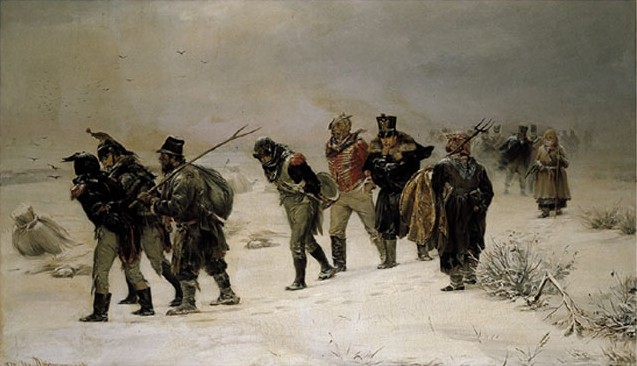 |
| In 1812, by Illarion Pryashnikov, via |
Reviewed by Susanna Allred
Published: 1991
It's about: The Diary of a Napoleonic Foot Soldier is the memoir of Jakob Walter, a German conscript in Napoleon's Grand Army. While many veterans of the Napoleonic Wars eventually wrote memoirs of their military service, Walter's is unique among them because it is written from the point of view of a private foot soldier. All first-person accounts to have surfaced so far have been written by men of the officer class who were more educated, cultured, and ideologically invested than he. Consequently, Walter's diary is especially valuable for its candid insights into the day-to-day experiences of a lowly conscript in Napoleon's massive military campaigns.
The Diary itself is divided into three sections; the 1806-7 campaign in Poland, the 1809 campaign in Austria, and the 1812 campaign in Russia. All three are a mix of Walter's casual anthropological observations of Eastern European culture, his accounts of combat in various battles, and personal reminiscences of military culture among foot soldiers. By far, the bulk of the Diary focuses on his memories of the retreat from Moscow, and the long months of starvation, cold, disease, and reprisals from Russian cossacks that it entailed. This section is rendered especially vivid though Walter's focus on his unending efforts to scavenge enough food to keep himself and his friends from starvation: a handful of raw meat from a slaughtered horse one night, a bit of cabbage boiled with dog fat the next. Nevertheless, the visceral nature of his memories is balanced by an off-hand and modest tone.
I thought: Jakob Walter's memoir is a concise and engaging account of a foot soldier's observation of the turmoil wrought by Napoleon's wars. By this point in history, most people's mental image of those wars is heavily influenced by fiction: War and Peace, Horatio Hornblower, and Master and Commander study the Napoleonic Wars through the eyes of ideologically engaged and aristocratic literary heroes. By contrast, the historical Jakob Walter embarked on his first campaign as a foot soldier conscripted out of private life as a stonemason. Furthermore Walter was remarkably indifferent to Napoleon's personal charisma and political principles for two reasons. First, Walter's native German principality of Swabia had recently been made a tributary state of Napoleonic France; second, as a low-ranking private citizen, Walter had little to gain from his participation in the wars.
For the most part, the Diary actually benefits as a work of literature from Walter's political indifference and lesser education. His prose style is plain, direct, informal, and completely readable. Walter generally restricts his attention to his own experiences, generally refusing to speculate or comment on the political context of the war or the motivations of the generals and princes who directed its progress. While he does not shrink from fully recounting the shocking deprivations of the retreat, he is never stoops to self-pity or recrimination. However, this same limited scope can become frustrating. As a reader, I very much wanted to know what Walter thought of his own conscription and Napoleon's military projects, but the author is generally silent on these matters.
Walter's self-portrait is filled with intriguing contradictions. In the 1806-7 portion especially, he casually recounts drinking binges, brutally requisitioning supplies, and violently forcing Polish peasants to act as guides and translators with little embarrassment. This unapologetic roughness is offset by pious allusions to his Catholic beliefs, and his evident affection for the brother and two sisters from whom he is separated by war. At one point, he finds a book he deems insulting to his faith and "bound a stone to this book, and sank it in the big lake." When Walter, nearly dead from typhus and malnutrition, is finally able to visit with his younger sister after the retreat from Moscow he mentions that they "tarried as a loving brother and sister for an hour's time and then parted again with tears." However, Walter's personal contradiction add up to a convincing portrayal of a conflicted, complex human.
Verdict: Stick it on the shelf.
Reading Recommendations: For an interesting historical comparison, read In Deadly Combat: A German Soldier's Memoir of the Eastern Front Gottlob Herbert Bidermann's account of his military service to Nazi Germany against the Soviet Union.
Warnings: Some mild references to alcohol.
Favorite excerpts:
He [Napoleon] watched his army pass by in the most wretched condition. What he may have felt in his heart is impossible to surmise, His outward appearance seemed indifferent and unconcerned over the wretchedness of his soldiers; only ambition and lost honor may have made themselves felt in his heart; and, although the French and Allies shouted into his ears many oaths and curses about his own guilty person, he was still able to listen to them unmoved.
What I'm reading next: If On a Winter's Night a Traveler by Italo Calvino








